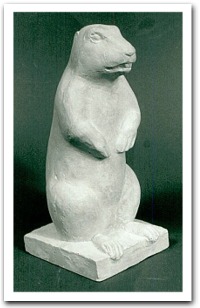[P_SiouxDogs/pdqnav2.htm]
 |
LEWIS AND CLARK AND THE STORY OF ONE SPECIAL
PRAIRIE DOG
As Lewis and Clark explored the grasslands of the
Midwest, they encountered thousands of mounds and what they call
“barking squirrels”. A strange site and difficult to explain, the
group decided to capture one of these unusual creatures and send it
to President Jefferson. This proved to be a difficult task as the
prairie dog would scurry into one of their hundreds of burrows at
the first sign of peril.
Not realizing the vastness of the
prairie dog network of tunnels the travelers attempted to capture
one of these furry creatures by digging into the mounds, only to
come up empty handed.
After other attempts a prairie dog was
captured when the explorers poured several barrels of water into the
labyrinth to flood one of the animals out.
|
|
The captured prairie dog began its long journey to Washington. A
boat ride down the Missouri River to St. Louis was followed by a
transfer to another boat, which took him down the Mississippi River.
The destination was New Orleans. Now aboard a ship this rodent
traveled up the Atlantic Ocean to Baltimore. A wagon ride and three
months after capture, the prairie dog reached Washington. After
meeting with an amused President Jefferson, the prairie dog was
placed on public display in Philadelphia. |
PRAIRIE DOG PEDIGREE
| Statistics |
A REAL Prairie Dog |
The Art Center's
version of a prairie dog |
| Adult Height |
approx. 12 inches |
5 foot |
| Adult Weight |
1-3
pounds (males 15 % heavier than females) |
150-200 pounds depending on artist's
creativity |
| Taxonomy |
burrowing rodent,
related to the squirrel, called "barking squirrels" by the Lewis and
Clark expedition team |
member of the public
art family, related to the cows of Kansas City, Las Vegas & New
York, the angels of Los Angeles, Charlie Brown & Snoopy of St.
Paul, love seats of Chicago, and J Doe of Omaha |
| Nourishment |
grasses, other plants,
occasionally insects; feed above ground during the day |
no nourishment required,
sustained by oohs and aahs of humans, photo ops, and conversations
with small children |
| Species |
black-tailed,
Gunnison's, Utah, white-tailed and Mexican |
painted, sculpted,
tatooed, pierced, split, clothed |
| Habitat |
large colonies, also called
towns or villages. Burrows are anywhere from 6' - 15' deep and
30' - 100' long, contain turn-around spaces and a nest refered to as
"the nursery" |
Siouxland, Tri-state
area. Sioux City, South Sioux City, North Sioux City,
LeMars, Emerson, Norfolk, Vermillion, Yankton among others |
| Mounds |
prevent flooding,
provide higher stance for prairie dogs to watch for preditors,
encourages ventilation underground |
fiberglass sphere
provides higher stance for the Prairie Dog to watch for tourists and
the return of Lewis and Clark |
| Family Groups |
called coteries |
called siblings |
| Breeding |
as many as 26 prairie
dogs may live in one coterie containing one breeding male, 3 or 4
breeding females, and seveal non-breeding yearlings and juveniles |
the genesis began with
an 18 inch Murray the Model Prairie
Dog, by Martin Wanserski, associate
professor of the sculpture department at USD, Vermillion. With Murray as a model,
Wanserski then engineered the 5' version of Murray. Breeding (fabricating) takes
place in Omaha at Composite Structures, Inc. The facility can "birth" 2
prairie dogs per day. |
| Life Span |
males - up to 5 years;
females - up to 8 years |
males and females are
equally immortal |
| Predators |
coyotes, bobcats,
badgers, black-footed ferrets, golden eagles, prairie falcons and
humans |
vandals, chain saws,
buses |
| Endangered |
Mexican prairie dog is
endangered, the Utah prairie dog is threatened |
not currently on either the
threatened or endangered list |
| Sleep Habits |
nocturnal |
never sleep, entertain
the public 24/7 |
SIOUX CITY ART CENTER CONTACTS FOR THE PDQ
Al Harris-Fernandez, Director
Extension 212
aharris@sioux-city.org
Jill I. Collins, Administrative Assistant
Extension 208
jcollins@sioux-city.org
Sioux City Art
Center
225 Nebraska
Street
Sioux City ,
IA
51101-1712
712.279.6272 |